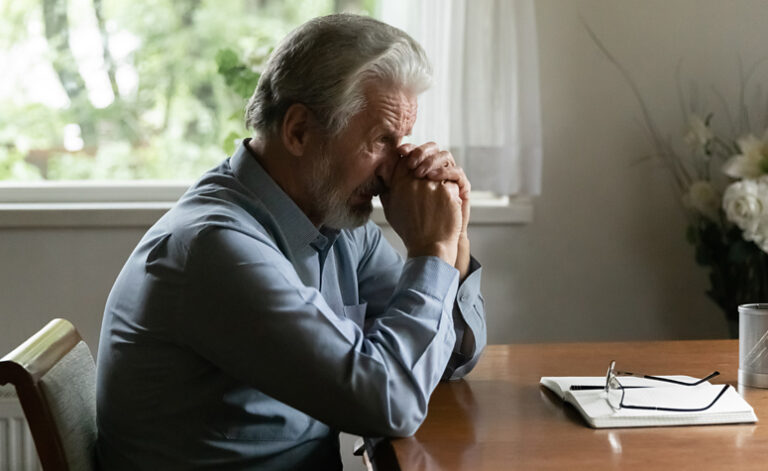Understanding and Treating Depression
Depression is a complex mental health condition suffered by millions of people all over the world. Depression affects more than just the individual; it can take its toll on their relationships, work productivity, and overall quality of life. It’s crucial to recognise depression as an actual medical condition that requires attention and treatment and not see it as a sign of weakness or a personal flaw.
This guide aims to give you valuable insights, evidence-based strategies, and a supportive approach to managing depression treatment. Remember, depression is a completely treatable condition, even in its most severe form.

Prevalence of Depression
Depression is a widespread mental health disorder that can affect anyone, regardless of their background. Based on statistics on depression from the National Institute for Health and Care Excellence (NICE) and the Office for National Statistics (ONS), it’s estimated that around one in six people in the UK will go through a period of depression at some point in their lives.
These figures underscore the significance of this condition and highlight the need to promote awareness and understanding of depression. Depression shows no regard for age, gender or socioeconomic status; it is a condition that can affect people across diverse backgrounds.
Understanding depression
To effectively manage depression treatment, it’s essential to have some understanding of this mental health condition. Depression usually causes you to feel low. At times, these emotions can be so severe they interfere with your ability to function in your daily life. Other symptoms of depression include:
- Persistent feelings of sorrow
- Loss of interest in activities you used to enjoy
- Changes in your appetite and sleep patterns
- Fatigue
- Difficulty concentrating
- Body aches and pains
- Thoughts of self-harm or suicide
The causes of depression are complex and may be a combination of genetic, biological, environmental, and psychological factors. Anyone can experience depression; however, there are risk factors that make specific individuals more vulnerable to this condition.

There is not just one but several types of depression. Each type is distinguished by its own set of characteristics and triggers and requires tailored treatment approaches. The different kinds of depression include the following:
- Severe depression
- Severe depression with psychotic symptoms
- Mild to moderate depression
- Bipolar depression
- Dysthymia (also known as persistent depressive disorder (PDD))
- Recurrent depressive disorder
- Postpartum/postnatal depression
- Seasonal affective disorder (SAD)
- Depression as part of a “cyclothymia” where one’s mood cycles rapidly between feeling good and feeling bad; this may even occur on the same day
The diagnostic evaluation for depression is done by a healthcare professional, often a psychiatrist or mental health specialist. It involves thoroughly assessing symptoms, medical history, and possible causes and risk factors.
In the diagnosis of depression, healthcare professionals may use standardised criteria such as the DSM-5. They may also seek to rule out other medical conditions that can mimic the symptoms of depression. It is crucial to get a diagnosis for your depression as it will be the basis for developing an appropriate treatment plan that can enable you to move forward towards a healthy future.

What lies behind us and what lies before us are
tiny matters compared to what lies within us
Depression Treatment Options
There are many different types of treatment for depression, all dealing with the complexities of this condition and assisting people in getting back on course. Good treatment plans are tailored to meet an individual’s unique needs, and a combination of approaches is likely to yield the best results.

Talking therapies
Talking therapies play a critical role in the treatment of depression. Cognitive Behavioural Therapy (CBT) is one type of therapy commonly employed in the treatment of depression. CBT is used worldwide to treat many mental health conditions, including depression. It is grounded on the principle that the unhealthy, negative emotions and complications that characterise mental health problems like depression are the result of deeply rooted thought patterns and behaviours.
CBT involves identifying and changing your unhealthy thought patterns and any negative behaviours, allowing you to think in a more balanced way and properly deal with any negative assumptions you may have.
This therapy also teaches you coping mechanisms you will find helpful for the rest of your life. You will be able to recognise when negative thoughts begin to enter your mind and deal with them in a healthy way. Being able to do this lessens the chances of you becoming depressed again in the future. Learn more about CBT for depression.
Aside from CBT, there are other therapies that may also be beneficial in the treatment of depression, depending on your personal needs and preferences. These include:
- Dialectical behaviour therapy (DBT)
- Cognitive analytic therapy (CAT)
- Mindfulness
- Acceptance and commitment therapy (ACT)
- Interpersonal therapy (IPT)
- Compassion focused therapy (CFT)
- Emotion-focused therapy (EFT)
- Person-centred therapy (PCT)
- Repetitive transcranial magnetic stimulation (rTMS) – an innovative treatment method which uses rapidly changing magnetic fields to stimulate areas of the brain that are involved in mood regulation
Medication
Medication may also be prescribed to complement CBT and other forms of depression therapy. They help complement talking therapy and also provide additional protection against depression.
In some cases, however, antidepressants are the first treatment option for depression, most especially when:
- Depression is severe or comes and goes
- The individual responded well to antidepressants in the past
- Talking therapies alone are not successful in helping an individual
deal with their depression - There is a history of depression in the family
- The individual has suicidal thoughts
Antidepressant medications work by helping the brain regulate chemicals and alleviate symptoms. Examples of these medications are selective serotonin reuptake inhibitors (SSRIs), serotonin-norepinephrine reuptake inhibitors (SNRIs) and tricyclic antidepressants (TCAs).
Depressions that are more difficult to treat may also be managed with monoamine oxidase inhibitors (MAOIs); however, these are now rarely used.
Being in close consultation with a healthcare professional is critical to determine the best depression medication for you, be informed of its potential side effects and ensure that you only use it as prescribed.
Alternative treatments
It is also worth looking into alternative treatments for depression. Supplements such as omega-3 fatty acids and vitamin D and herbal remedies like St John’s Wort can be helpful when dealing with mild to moderate depression.
Additionally, mind-body techniques such as yoga, meditation, and acupuncture can help you relax and promote emotional wellbeing, thereby reducing symptoms of depression. Finally, there is light therapy, which harnesses the ability of bright light to regulate a person’s circadian rhythm, thereby alleviating depression by improving their mood.
Hospital and residential treatment
If you are experiencing severe depression, or if significant risk factors accompany it, you might need residential treatment within a hospital.
Specialist inpatient treatment for depression is available at residential mental health hospitals. This intensive therapy includes medication management, structured routines and a supportive environment. This treatment setup also gives you the chance to be away from outside influences or remove yourself from the environment that might be making your depression worse.
For people who need a higher level of care and support to stabilise their condition, residential depression treatment is most likely the best option.

Lifestyle changes
Alongside professional interventions, making healthy lifestyle changes is a tremendous and even lasting coping strategy to combat depression. Eating a balanced diet, exercising regularly, getting enough sleep, doing relaxation techniques, and doing things you love can enhance your wellbeing. These modifications in your lifestyle can be a great complement to other treatment approaches and boost the effectiveness of combined depression strategies.
Every individual’s struggle with depression is unique, and treating it requires much patience and collaboration. However, with the proper support, it is absolutely possible for you to recover from depression completely.

Fast Access to Residential Treatment
We are currently able to offer fast access to private inpatient treatment.
Please call us today and speak to one of our expert advisors.
Call in confidence: 0800 0148 970
Depression Treatment at AddictionRehab
We are recognised for our comprehensive and specialised depression treatment options and for providing people with a variety of choices to meet their needs. Whether you need intensive care or are searching for more flexible treatment options, we have different programmes to support you.
We always look into your unique circumstances before offering treatment options to ensure you get the best support. Depending on the severity of your depression, we have a variety of treatment programmes that we can provide for you.
Inpatient treatment for depression
Our inpatient depression treatment involves staying at one of our a specialist hospitals on a residential basis. There, we will provide 24-hour care from our expert professionals in a safe and supportive environment. Inpatient treatment includes individual therapy, group therapy, medication management and wellbeing activities. This option is beneficial for people struggling with severe depression or when other treatments have been tried and proved to be unsuccessful.
Outpatient treatment for depression
We also have an outpatient treatment service for people who prefer a more flexible approach. Depression treatment on an outpatient basis is offered at our clinics and wellbeing centres. Outpatient treatments involve attending weekly therapy sessions while being able to live and be home to fulfil their responsibilities and maintain their daily routines. This is a good option for those with less severe symptoms of depression or people transitioning from inpatient care.
Day care for depression
Another option is our day care treatment, where we provide structured therapy and support to individuals during the day and allow them to go home in the evenings. This approach combines therapy sessions, group activities, and skill-building workshops to improve coping strategies and promote long-term recovery. Day care treatment can be done on a full or half-day basis, depending on your needs.
Online therapy for depression
We realise the importance of accessibility and convenience for our clients, thus our online depression therapy. These virtual sessions allow you to receive evidence-based therapy within the comfort of your home. Our online therapy provides the same high standards as our in-person treatments. Using secure and confidential platforms, our experienced clinicians will guide you through your depression treatment journey.
Specialists in the treatment of depression
We at take pride in our team of highly skilled professionals who have extensive experience in depression treatment. They are the ones that make us stand out from the rest. Our team consists of psychiatrists, psychologists, therapists, nurses and support staff, all dedicated to providing personalised support to everyone we care for.
Each team member has the experience and expertise to understand the complexities of depression and tailor treatment plans to address your unique needs. With our holistic and multidisciplinary approach, you are assured of comprehensive support for your mental, emotional and physical wellbeing.
We also believe in empowering you to actively participate in your recovery. We do this by helping you develop strategies to manage your depression symptoms through collaborative treatment planning and a person-centred approach. With these tools, you can sustain your progress after completing your initial treatment with us, enabling you to achieve long-term wellbeing.
Support and Coping Strategies
If you or one of your loved ones are struggling with depression, there are many helpful coping strategies and sources of support available. Below are some tips to help you manage and find the support you need:

- Find supportive relationships
Spend time with understanding and compassionate people who can listen to you and offer emotional support. Connect with trusted friends and family members, and invite them to participate in your treatment journey as much as possible.
- Join support groups
Consider being a part of local or online support groups that specifically cater to people with depression. These groups offer a safe space to connect with others who understand your struggles, share your experiences and receive empathy and validation. Rethink Mental Illness provides information on different mental health groups across the UK, and Mind has an online support community that you can access help any time you need help.
- Call hotlines and helplines
Crisis hotlines and helplines are always ready to provide immediate support during difficult times. Organisations such as Samaritans offer helplines that provide confidentiality with staff who are trained professionals ready to give guidance and advice whenever you need it. If you feel you are in crisis with your depression and require immediate care, there are crisis support helplines you can call, including your local NHS mental health helpline.
- Learn about depression
Make use of resources and educational materials both online and offline about depression. Organisations like the Royal College of Psychiatrists (RCPsych) provide valuable information, guides and brochures to help you gain a better understanding of depression, including its symptoms and treatment options.
- Practise self-care
Give priority to self-care activities that promote mental and emotional wellbeing. Incorporate things that help you relax and give you joy and a sense of fulfilment into your daily schedule; this can be exercise, hobbies, spending time in nature, or a creative activity.
- Establish a routine
A structured routine can give you a sense of stability and purpose. Try to maintain regular sleep patterns, follow a regular schedule for your meals, have a balanced diet, and have dedicated time for activities that promote productivity and self-care.
- Consider seeking professional help
Depression is a complex condition and often requires professional support. If you’re struggling struggling with depression, consult a mental health professional, such as a therapist or psychiatrist. If needed, they can develop a tailored treatment plan, therapeutic interventions, and medication management.
Remember, your journey in coping with depression is your own; there is no one-size-fits-all approach. You need to be patient with yourself and find support that addresses all your needs. If you build a network of support and use healthy coping techniques and strategies, you can start getting back on course.

Preparing for Your First Appointment
If you have reason to believe that you are depressed or have noticed yourself experiencing some of its symptoms, you must seek professional help. Without the proper treatment, depression can worsen and adversely affect every area of your life. Getting help early is critical.
Your first stop would usually be your GP. They’ll be able to evaluate your symptoms and give you medical advice. There are a few things you need to take with you to your appointment for you to be able to maximise your consultation with your GP.
- Gather relevant information
Before going to your appointment, preparing a list of your symptoms will be helpful, including how long you have been experiencing them and how severe they are. Making a list of medications you are currently taking will also be useful. Be ready to tell your GP about significant life events, stressors or changes that may have influenced your feelings.
- Bring necessary documents
Provide your GP with any relevant documents such as medical records, previous test results or notes from other professionals you may have consulted or have given you treatment for your mental health issues.
- Prepare questions
List down any questions you have about depression, treatment options, and other related concerns to ensure that all your queries are covered during the appointment and you don’t leave feeling you have missed something out.
- Be open and honest
As you discuss your condition with your GP, you must be completely open and truthful about your symptoms, thoughts and feelings. The more honest and transparent you are, the better your GP will be able to diagnose your problem and recommend the most appropriate treatment for you. GPs are experienced medical professionals who treat patient information with strict confidentiality; thus, you should not feel embarrassed or ashamed about anything you want to say. Your GP is there to help you.
- Take notes
It would be helpful to take a notebook to your GP appointment where you can write down important information. Doing this will help you remember key points and treatment recommendations.
- Discuss mental health specialist referral
If you feel that you need to see a mental health specialist for your depression, you can request your GP for a referral to a mental health treatment provider. They can give you more information on the referral process, the subsequent steps as well as potential funding options.
Remember, a GP appointment will give you the chance to express your concerns, receive a professional evaluation and look into treatment options. You can make the most of your appointment by coming well-prepared and participating actively during the consultation. By doing this, you are proactively working towards getting the specialist help you need, which may be with a private mental health treatment provider.
FREE Depression Assessment
If you or a loved one are struggling with depression, there is hope and healing for you. You can receive treatment as an outpatient or inpatient and through one-on-one or support group therapy. We understand the challenges you’re facing and we’re here to offer compassionate help and support.
We design personalised treatment plans that meet an individual’s unique needs and circumstances. We will work together to address your symptoms, help you develop coping strategies and enable you to live life to the full in a healthy and positive manner.
We also have a young people’s service which provides specialist depression treatment exclusively for adolescents and young people.
Our highly trained advisers are available to speak to you right away, simply call 0808 252 3379 today.
We can discuss your concerns in complete confidence, explore the options for treatment, and help you to understand what will work best for you.
We’ll also help you to book your free depression assessment there and then, with appointments usually available within only a few days.
We understand that taking the first step can be the most difficult, but we’re here to support – with no pressure or judgement.
Professional and compassionate help is just a phone call or click away.




